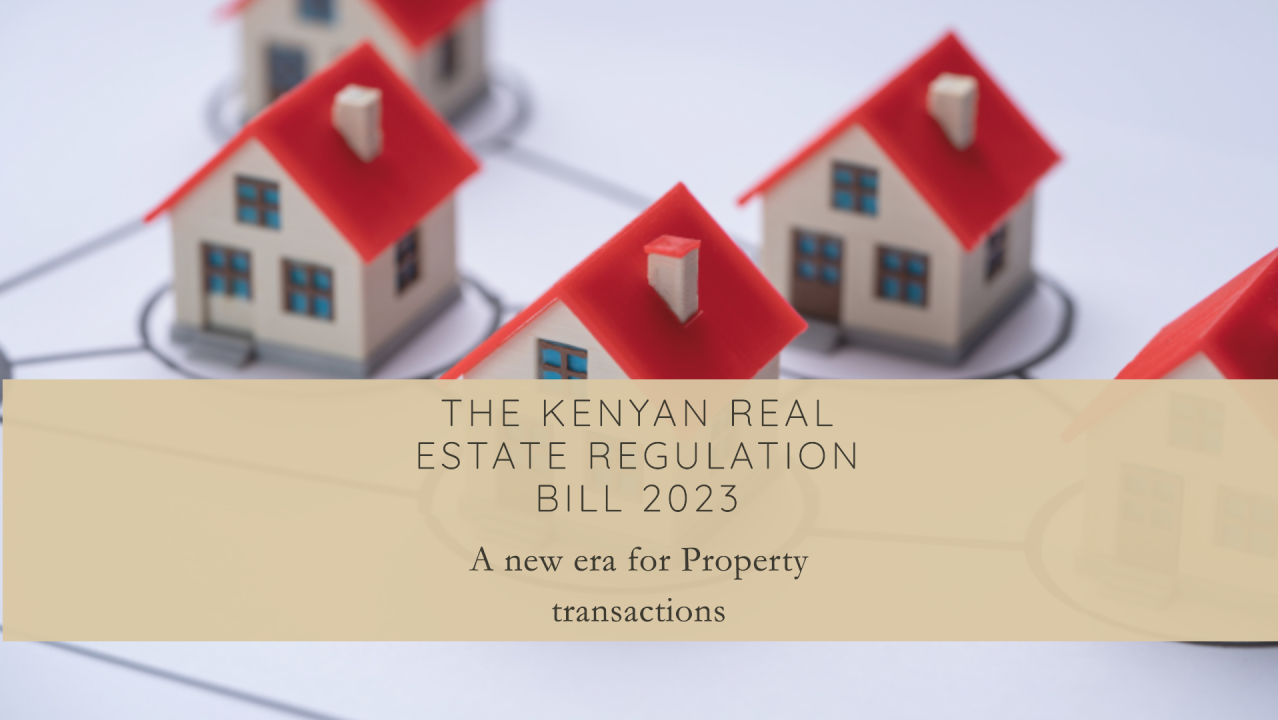Article by : Macduff Ronnie, Associate Advocate
In recent years, Kenya’s real estate sector has experienced significant growth, attracting both local and international investors. However, this rapid expansion has also brought challenges, including fraudulent practices and a lack of standardized regulations. Enter the Kenyan Real Estate Bill, a groundbreaking piece of legislation set to transform the landscape of property transactions in the country.
WHAT IS THE KENYAN REAL ESTATE BILL?
The Kenyan Real Estate Bill is a comprehensive legislative framework designed to regulate the real estate sector. Its primary goals are to ensure transparency, accountability, and consumer protection in all property-related transactions. This bill represents a significant step towards professionalizing the industry and safeguarding the interests of all stakeholders involved.
KEY OBJECTIVES OF THE BILL
1. Regulation
The bill aims to establish a robust framework for licensing real estate agents and firms. This move will help weed out unscrupulous operators and ensure that only qualified professionals can practice in the sector.
2. Consumer Protection
A core focus of the bill is to protect buyers and tenants from fraudulent practices. By implementing strict guidelines and oversight, the legislation seeks to create a safer environment for property transactions.
3. Transparency
The bill emphasizes the importance of clear and honest transactions in property dealings. This increased transparency will help build trust between agents, buyers, and sellers.
4. Professionalism
By promoting ethical standards and professionalism among real estate practitioners, the bill aims to elevate the overall quality of service in the sector.
KEY PROVISIONS OF THE KENYAN REAL ESTATE BILL
1. Licensing and Registration
Under the new bill, all real estate agents and firms will be required to obtain a license to operate. This process will be overseen by a regulatory authority, ensuring that only qualified and reputable individuals and companies can engage in real estate transactions.
2. Code of Conduct
The bill introduces a comprehensive code of conduct for real estate practitioners. This set of ethical guidelines will serve as a benchmark for professional behavior in the industry.
3. Dispute Resolution
Recognizing the potential for conflicts in property transactions, the bill establishes mechanisms for resolving disputes between agents, buyers, and tenants. This provision aims to provide a fair and efficient way to address grievances without necessarily resorting to lengthy court processes.
4. Consumer Rights
The bill places a strong emphasis on protecting consumer rights. This includes the right to accurate information about properties and fair treatment throughout the transaction process.
5. Penalties for Non-Compliance
To ensure adherence to the new regulations, the bill introduces penalties for non-compliance and fraudulent activities. These penalties serve as a deterrent against unethical practices in the sector.
EXPECTED IMPACT OF THE BILL
1. Increased Market Confidence
By implementing regulated practices, the bill is expected to boost confidence in the real estate market. Investors and homebuyers alike will feel more secure knowing that their transactions are protected by law.
2. Enhanced Professionalism
The new regulations are likely to raise the bar for service quality and ethical behavior among real estate agents. This could lead to a more respected and trusted profession.
3. Improved Consumer Safety
With stronger protections in place, property buyers and tenants will be less vulnerable to fraudulent schemes and unfair practices.
4. Economic Growth
A more transparent and reliable real estate sector can attract increased investment, potentially driving economic growth in Kenya.
CHALLENGES IN IMPLEMENTATION
While the Kenyan Real Estate Bill promises significant improvements, its implementation may face several challenges:
1. Effective Enforcement: Ensuring compliance with the new regulations may require substantial resources and a robust enforcement mechanism.
2. Industry-wide Compliance: Getting all real estate practitioners to comply with the new regulations could be a complex and time-consuming process.
3. Public Awareness: Educating all stakeholders about their rights and responsibilities under the new bill will be crucial for its success.
CONCLUSION
The Kenyan Real Estate Bill represents a significant milestone in the country’s property sector. By promoting transparency, professionalism, and consumer protection, it aims to create a more trustworthy and efficient real estate market. While challenges in implementation remain, the potential benefits for buyers, sellers, tenants, and the overall economy are substantial. As Kenya continues to grow as a hub for real estate investment in East Africa, this bill could play a crucial role in shaping a more prosperous and equitable future for all stakeholders in the property market.





